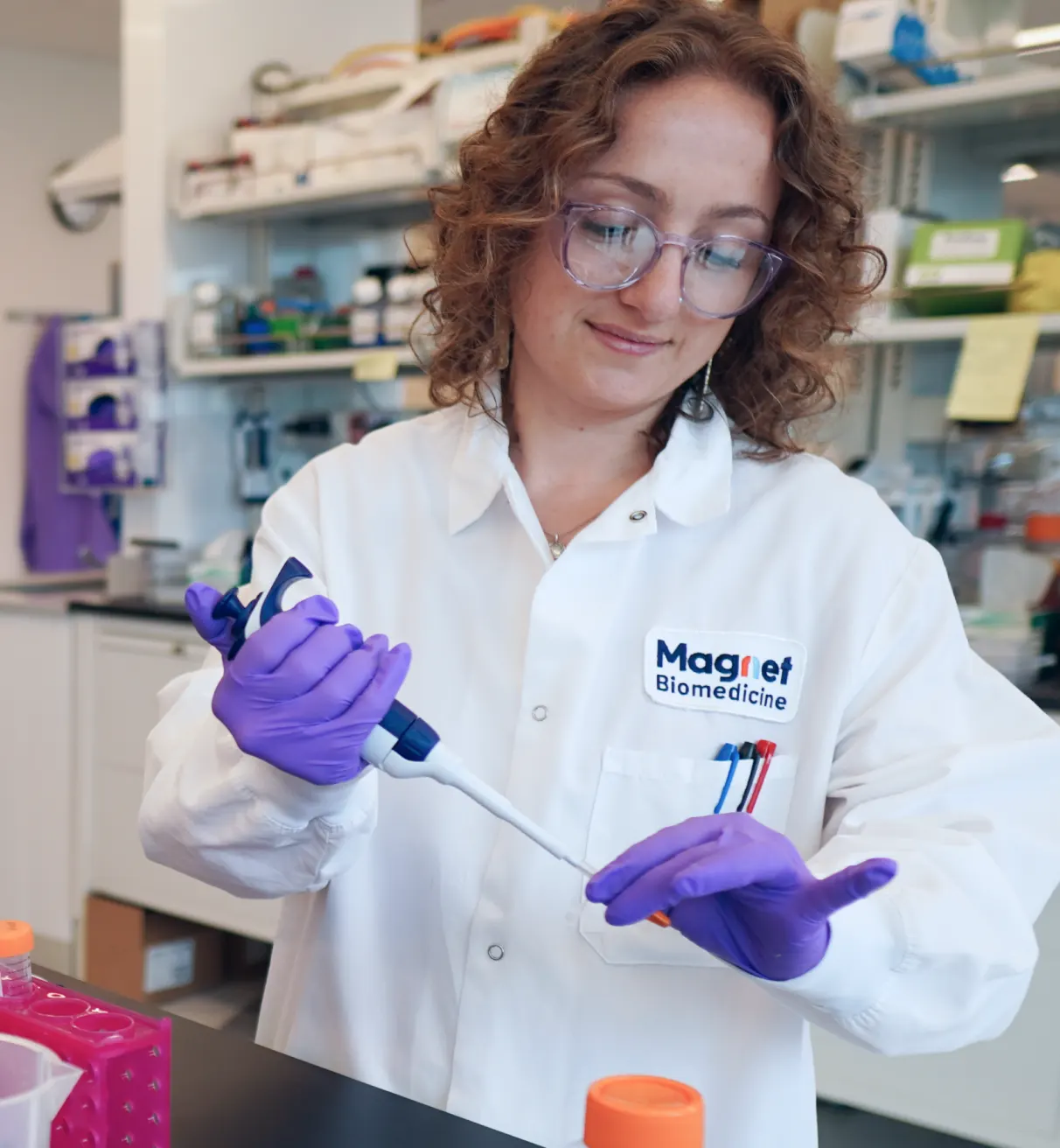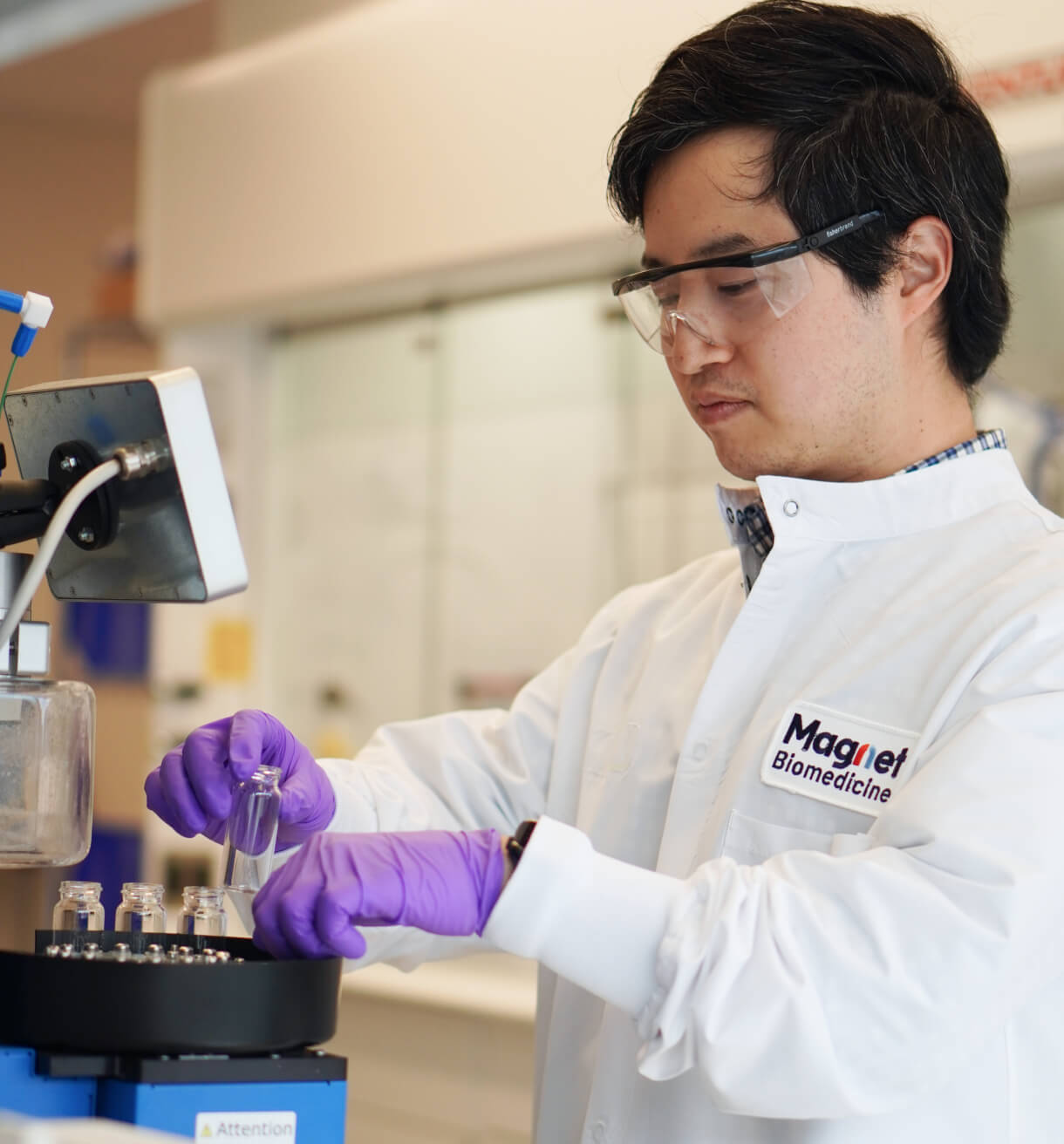Advancing precision medicine with molecular glues
Magnet Biomedicine's modular TrueGlue™ technology enables the systematic discovery of molecular glues toward the treatment of human disease.



The Science
TrueGlues are specialized small molecule therapeutics that induce proximity between a disease-relevant target and a “presenter” protein, resulting in novel presenter-dependent biology.
Magnet is advancing precision medicine through the systematic design of molecular glues capable of inducing novel protein-protein interactions (PPIs) and unlocking novel biology. Magnet's TrueGlueTM platform enables the rational selection of protein pairs and the systematic design of molecular glues to achieve unprecedented therapeutic goals.

When a TrueGlue binds to a presenter protein, a neo-PPI interface is created, mediating the formation of a ternary complex with a disease target protein, and resulting in presenter-dependent engagement of the target protein.
TrueGlues offer the potential to deliver therapies for even the most intractable targets and to achieve other desirable but challenging translational goals:
- Novel PPIs can overcome limitations in ligandability of target proteins
- Tissue specificity of a presenter can minimize on-target-off-tissue toxicity
- Extracellular presenters can enable glue inhibitors of cytokines/receptors to substitute oral small molecules for injectable biologics
Since their discovery more than three decades ago, molecular glues have demonstrated vast potential to treat human disease.
Magnet is redefining the potential of molecular glues by looking beyond E3 ligases and exploring the broader protein landscape. By strategically pairing target proteins with endogenous presenter proteins, we can explore additional MOAs, unlock novel therapeutic possibilities, and pioneer new treatment paradigms.
Uniquely enabled by its platform capabilities, Magnet is pioneering the discovery of novel molecular glue medicines to address a range of indications with high unmet need in cancer and immune disorders.



OUR TECHNOLOGY
Building upon recent advances in proteomics, screening, and bioinformatics, we believe that leveraging these advances will enable our goal of rational molecular glue discovery and development.
Magnet's TrueGlue™ discovery platform utilizes state-of-the-art screening technologies, proprietary chemical libraries, and strategic selection of target and presenter proteins to rationally and systematically identify TrueGlues™. These small molecules induce proximity and promote cooperativity between proteins, enabling precise drug targeting to disease-relevant tissues and addressing historically difficult-to-drug proteins.

OUR PEOPLE
Magnet’s team combines decades of drug discovery experience.
Our diverse scientific expertise has enabled a multipronged approach that pushes the boundaries of existing technology to advance TrueGlues as a therapeutic modality with the potential to alter the treatment landscape in cancer and autoimmune diseases.
- All
- Leadership
- Team
- Founders
- Board Of Directors
- Scientific Advisory Board

Brian Safina, PhD
President & Chief Executive Officer
Nick Vlahakis, MBBS
Chief Medical Officer
Bharat Reddy, PhD
Chief Business Officer
Bret Williams, PhD
Senior Vice President of Research
Matthew Hayward, PhD
Vice President of Drug Discovery
Jennifer Franklin
Vice President of Operations
Kristina Burow
Managing Director at ARCH Venture Partners
Thomas Cahill, MD, PhD
Founder and Managing Partner at Newpath Partners
Seiji Miyahara, PhD
Partner & Senior Investment Director at Taiho Ventures
Jay Parrish, PhD
Venture Partner at ARCH Venture Partners Chairman and CEO at Pretzel Therapeutics
Ramnik Xavier, MD, PhD
Scientific Advisory Board Chair
Benjamin F. Cravatt, PhD
Founder & Advisor
David A. Spiegel, MD, PhD
Founder & Advisor
Michael Rosbash, PhD
Founder & Advisor
Richa Saxena, PhD
Founder & Advisor
Stuart Schreiber, PhD
Founder & Advisor
Douglas Beshore, PhD
Chemistry
Austin Carr, PhD
Proteomics
Gina Chen
Chemistry
Xiao Chen, PhD
Biology
YiQun Chen
Biology
Jessica Gasser, PhD
Biology
Adarsh Godbole
Biology
Kara Herlihy
Biology
Yuan Hu, PhD
Chemistry
Bruce Hua, PhD
Chemistry
Liam Hudson, PhD
Chemistry
Anita Kim
Lab Operations
Chueh-Ling Kuo, PhD
Biology
Jason Lowe, PhD
Chemistry
Alyssa Lutservitz, MS
Chemistry
Jessica McManus
Biology
James Ralff
Chemistry
Andrew Reidenbach, PhD
Biology
Olivia Sierra
Biology
Anthony Scruse, PhD
Chemistry
Danielle Thibault
Office Manager
Luke Stamatakis, CPA
Finance & Accounting
Tom Tian, PhD
Biology
Tiffany Tsang, PhD
Biology
Go Watanabe, PhD
Biology
Lauren Weiss
Biology
Hsin-Lan Wen, PhD
BiologyCAREERS
Magnet Biomedicine is building a world-class team to unleash the scientific breakthroughs and expertise of our founders.
We are looking for creative, thoughtful, science-first innovators to join our collaborative team. Come help us realize the potential of molecular glues to achieve the broadest possible impact for patients.
Scientist, Biophysics/Biochemistry





